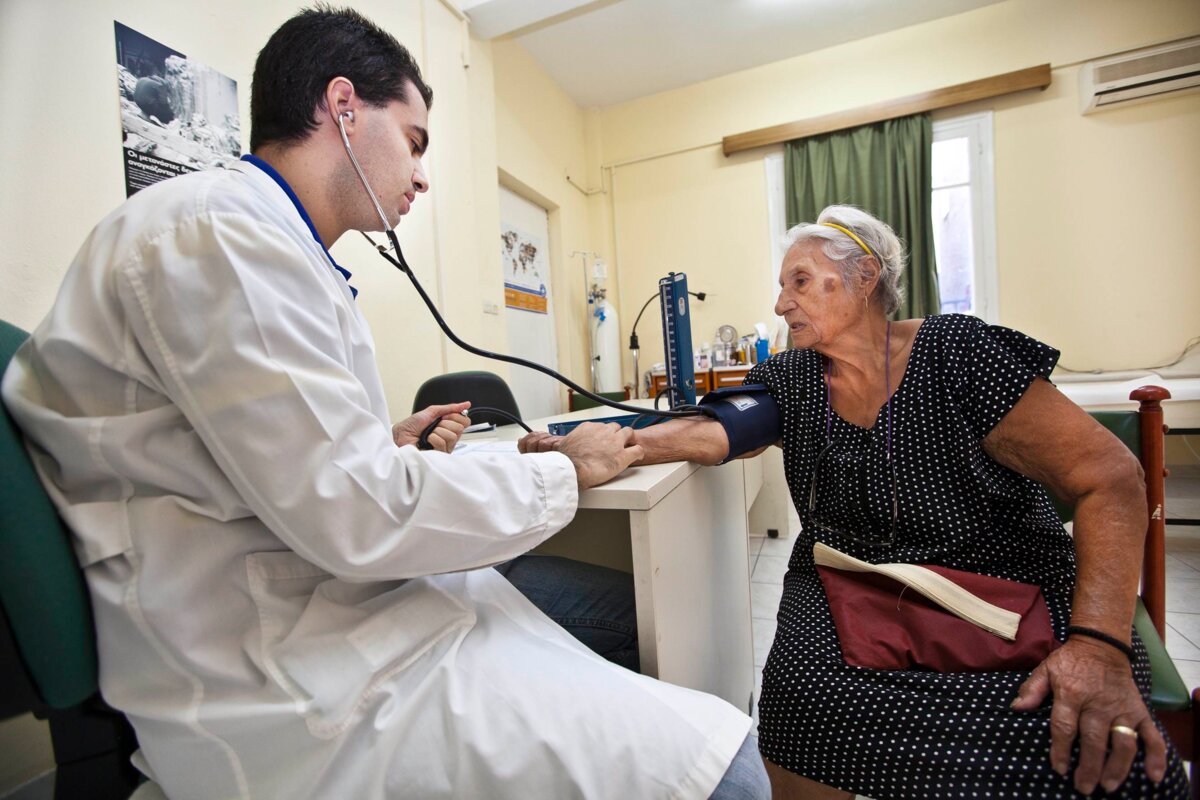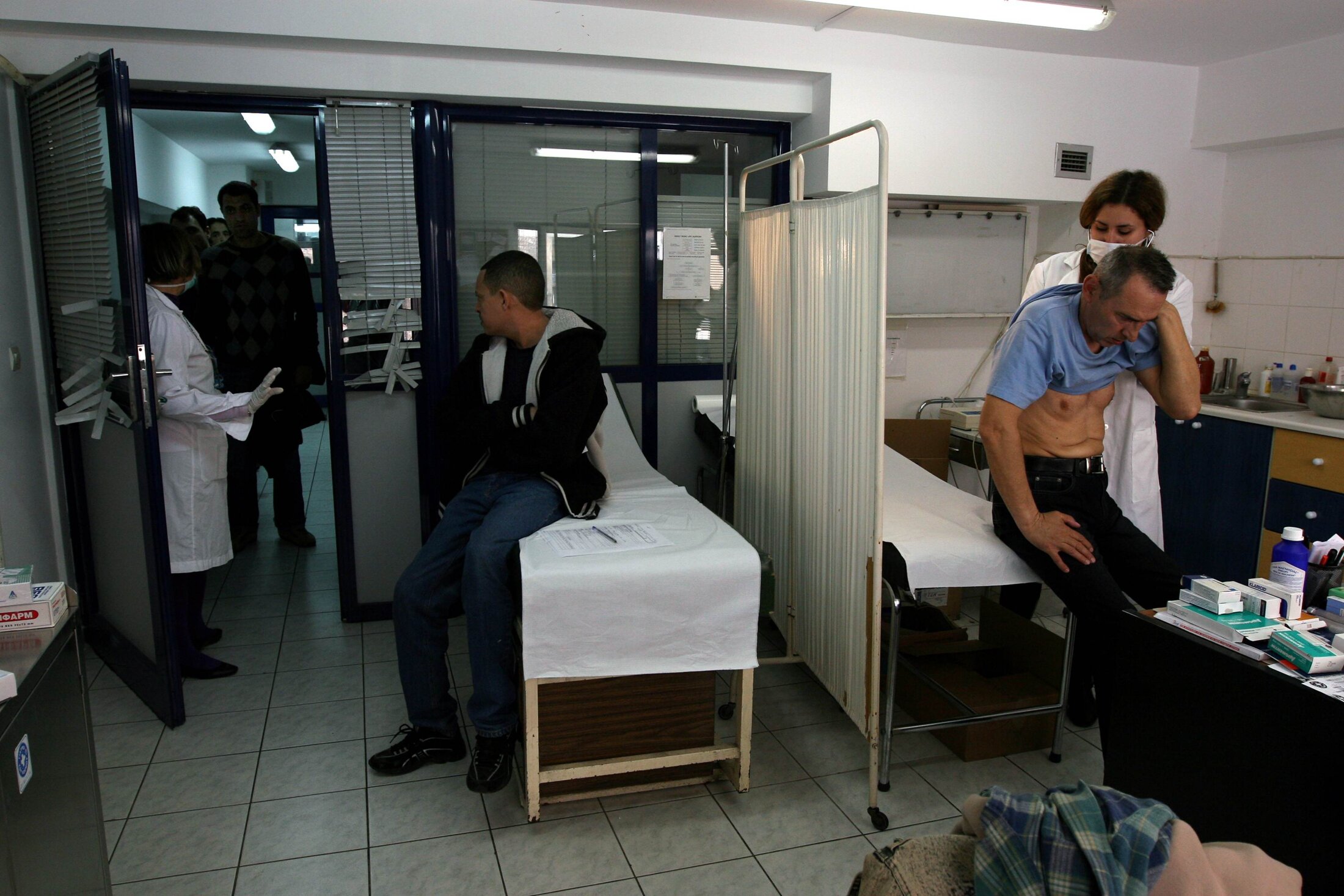French NGO Médecins du Monde (the umbrella network that includes Doctors of the World), which provides healthcare to the needy across the globe, originally opened its clinic in the Greek capital Athens to provide help for destitute immigrants and asylum seekers. But now the debt crisis has changed all that.
The severe austerity measures introduced by the Papandreou government, imposed in return for successive bailouts, has led to a sharp rise in the numbers of Greeks unable to pay for essential medical care. Greeks now account for almost one in three consultations at the humanitarian organisation's polyclinic, twice as many as last year, and include public sector workers, former small business owners, young mothers and rising numbers of the homeless.
With about 50 medical staff, mostly benevolent nurses and doctors, the Médecins du Monde (MdM) clinic is situated at the centre of
Athens, on Koumoundourou Square, and offers its consultations and medicines free of charge.
MdM also runs a similar clinic in Perama, a port city some 35 kilometres from the capital where the patients are nearly all Greek, and operates an itinerant mobile medical unit that visits the islands and remote country areas.
Christina Samartzi is the head of MdM's programme in Greece, and in this interview with Mediapart's Carine Fouteau she describes the desperate plight of increasing numbers of Greeks who, almost overnight, have plunged through the social floor into poverty.

Enlargement : Illustration 1

Mediapart: What effect has the economic crisis and austerity measures had on the profile of your patients?
Christina Samartzi: The major new thing is that we see more and more Greeks coming for help and to be treated here, where they know they can find, free of charge, General Practitioners, dermatologists, psychologists and pediatricians. That was not the case before, or at least only marginal. Médecins du monde set up in Athens to bring help to migrants, asylum seekers and refugees, principally from sub-Saharan Africa and central Asia.
Now coming here are the unemployed, low income workers in precarious employment, and the homeless who no longer have the means to pay for treatment. They can no longer pay private sector consultation fees. Nor do they have access to public hospitals where there is a standard entrance fee of 5 euros, that's already too much. They cannot buy medicines, either. They come here to obtain them free.
In 2011, the Greeks represented 30% of people admitted [to the centres]. There were half as many the previous year. In our centre at Perama, which is situated in a very poor region, only Greeks come.
Mediapart: When did you become aware of this evolution?
C.S.: It began at the end of 2010 and it was amplified at the beginning of 2011, then reaching a summit. In total, about 30,000 people have passed through us this year, against 20,000 one year earlier.
Mediapart: Who are the Greeks who have need of your services?
C.S.: The profiles vary, but we notice the presence of many women who are on their own with babies. These women no longer have access to the usual social services because the State no longer has the means to take charge of them. They come to have their children vaccinated. They need medicines and basic medical exams. There are also more and more elderly people, the retired who no longer have any income. We also admit civil servants who have seen their salaries crumble, as well as numerous former business owners. In the past, they could be rich, they were running flourishing small- and medium-sized businesses that went bankrupt from one day to the next and found themselves without anything. They are ashamed to come to the polyclinic. Some are so ashamed that they speak in English to pass off as migrants. They don't want us to think they are Greek.

Enlargement : Illustration 2

Mediapart: Who do they blame?
C.S.: They are desperate, without hope. They think that things are only going to get worse. They are angry because they feel impotent. They are firstly angry with the Greek government, and with Greek politicians in general, who they consider to be responsible for their situation, but also against the big countries of the European Union, foremost of which are Germany and France.
Mediapart: Do they have specific illnesses?
C.S.: Many of these people are under-nourished. We realize this when we prescribe medicines to be taken after a meal. They tell us that they don't have anything to eat. It's for that reason that we have launched a campaign in supermarkets to obtain basic food products, like milk, rice, pasta and oil. It is the first time that we have had to resort to this type of campaign. You could believe we were in Africa. Apart from that, we find the usual illnesses in people who live in the street, such as dermatological infections.
Mediapart: What are the solutions for housing and clothing?
C.S.: There are other associations, other NGO's, present but the funding is insufficient. We ourselves have an accommodation shelter, but it is reserved for migrants. We have a psycho-social service, with psychologists and social workers who inform people of their rights and point them towards other structures, but most of those are saturated. For clothing, we ask those who can to bring items in, and we redistribute them. At the very moment when we have the most need, when the State is faltering and there is only us, the associations, left to take up the relay, public subsidies are falling as is also the help from private donators.
-------------------------


